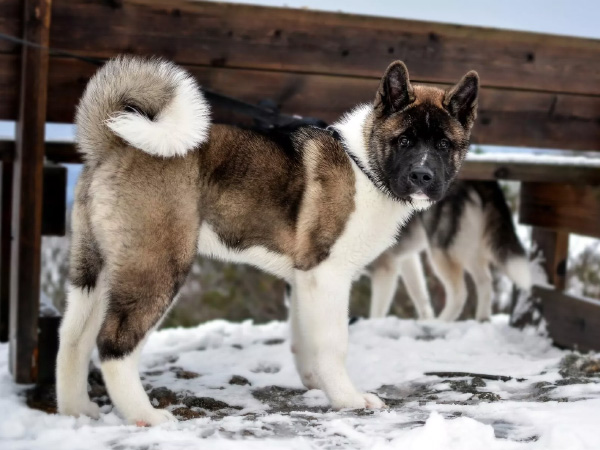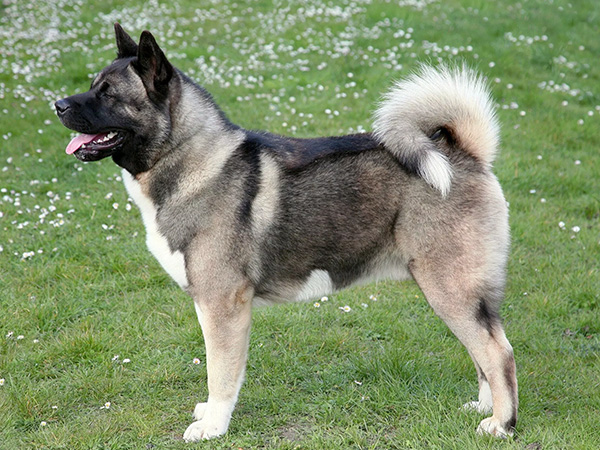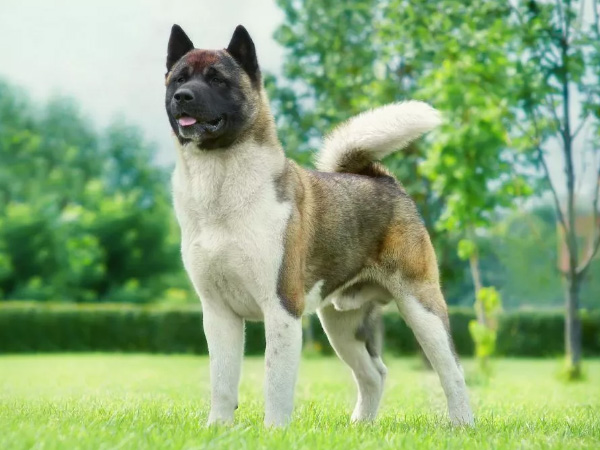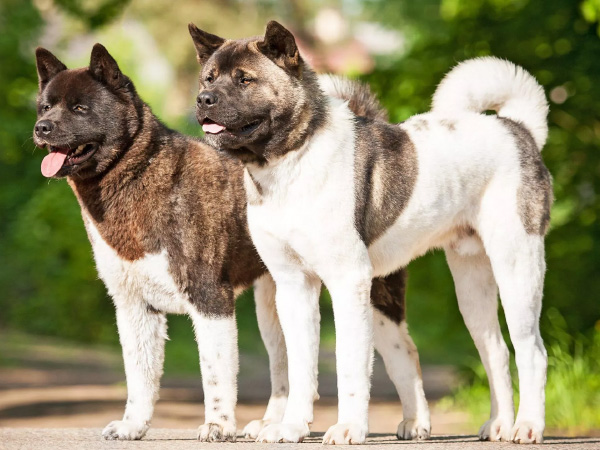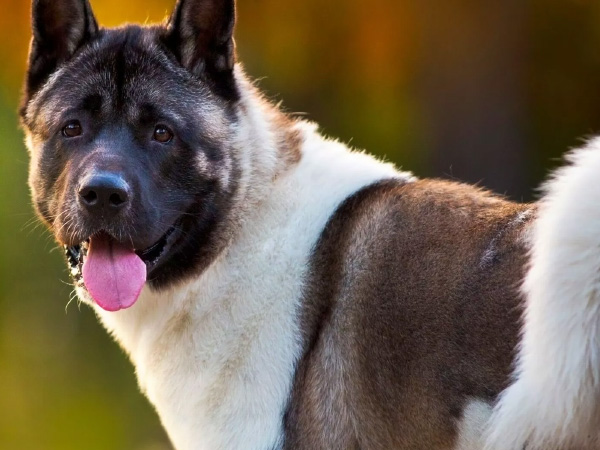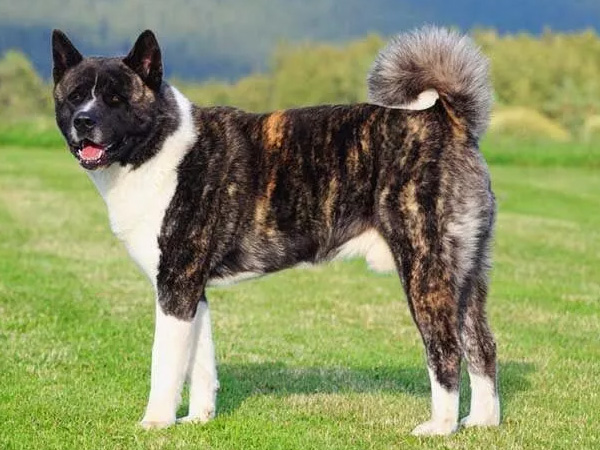This post is also available in:
Français (French)
Español (Spanish)
The Akita Dog is a unique and special breed of dog that has captivated the hearts of pet owners around the world.
With its regal bearing, gentle nature, and loyal temperament, it’s easy to see why this pup has become so popular in recent years.
As an expert on all things related to dogs, I’ve spent countless hours researching everything there is to know about these amazing animals—from their history and origins to their modern-day care requirements.
In this article, I’ll share with you some fascinating facts about Akitas and provide practical advice for keeping your new furry family member happy and healthy.
History And Origins Of The Akita Dog
The Akita dog is an ancient breed that hails from Japan, where it has been revered for centuries as a symbol of loyalty and courage. It was once bred by the ruling class in this country for hunting bear and wild boar, but today its primary purpose is companionship.
The Akita’s unique physical characteristics are well-suited to life in cold climates, making them immensely popular in North America. Like many other breeds, the Akita has experienced some changes over time due to selective breeding practices. While they still retain much of their original traits – such as a strong muscular build, thick double coat, and dignified demeanor – modern Akitas may be slightly larger than their ancestors were.
This means that potential owners should research any lines before committing to buying one of these dogs. Despite being relatively new to many parts of the world, the Akita holds great cultural symbolism in Japan.
They’re often given as gifts between friends and family members who have shared experiences or memories together; however, even those with no prior connection can be moved by the commitment displayed by this noble canine companion.
In addition to providing love and devotion to humans, the Akita also lends itself readily to various activities like agility training or weight pulling competitions. Owners will find their pup more than capable when it comes to performing whatever task they ask of him or her – proving that despite all our differences we ultimately share something special with man’s best friend: unconditional trust and boundless affection!
Characteristics Of The Akita Dog
The Akita Dog is a large, powerful breed that originated in Japan. Many people are drawn to the breed’s unique looks and noble demeanor. A good example of this can be seen with Shiro, an Akita owned by Joe Smith who lives in New York City. Shiro has been living with Joe for three years now, and displays all the classic traits of the breed:
- Social behavior: Akitas tend to have strong social skills and can often develop deep bonds with their owners.
- Grooming needs: Like most breeds of similar size, regular brushing and bathing is required to keep its fur healthy.
- Strength: The Akita dog is known for its strength and endurance – qualities which make it well-suited for long hikes or jogs alongside its owner.
- Intelligence: The breed ranks high in intelligence tests, meaning they can pick up new commands faster than other dogs of the same size.
As such, it comes as no surprise why so many pet owners choose the Akita Dog over any other type of canine companion – these animals offer both beauty and brains! With proper care and training, an Akita will give you a lifetime of loyalty and love.
Akita Dog Care Requirements
The Akita dog is a loyal and independent breed, requiring special care from its owners. It’s important to understand the breed’s characteristics in order to provide it with the best possible life. Now that we’ve discussed what makes this breed so unique, let’s move on to addressing their specific care needs.
When considering an Akita, potential pet parents should be sure they can meet all of the requirements for properly caring for one. Grooming needs are relatively high as these dogs have double-coated fur which sheds seasonally but also requires regular brushing between baths. This will help keep their coat healthy and free of mats or tangles.
Additionally, socialization needs must be taken into account when owning an Akita; proper training and positive reinforcement play a vital role in helping them become well-rounded canine companions.
Exercise is essential for any dog, especially those like the Akita who were originally bred as working animals! These pooches need plenty of physical activity such as long walks or hikes to ensure they stay happy and healthy throughout their lifetime. Taking your pup out regularly helps prevent boredom while preventing destructive behaviors at home due to excess energy build up.
Owning an Akita isn’t just about providing food and shelter – it’s about understanding their particular traits and taking steps towards meeting all of their needs. As responsible pet parents, we must do our best to make sure our furry friends stay comfortable in every way possible by giving them ample attention along with regular grooming and exercise sessions.
Both mentally and physically stimulating activities are key components for making sure your Akita live a full life!
Akita Dog Health Concerns
As a strong, intelligent breed of dog, the Akita is known for its loyalty and devotion to its owner.
However, despite their hardy nature and history as working dogs in Japan, there are certain health concerns that should be taken into consideration when caring for your Akita companion. It is important to understand the specific needs of this particular breed in order to ensure they remain active and healthy throughout their lives.
A holistic approach to nutrition can help maintain an optimal body weight while also providing essential vitamins and minerals needed by this type of dog. As with any breed, it’s important to provide balanced meals on a regular basis; however, due to their higher energy levels, Akitas need more calories than other types of dogs. Additionally, high-quality ingredients such as fish oils or krill oil may be beneficial additions to promote overall well being.
Certain illnesses have been linked specifically to the Akita breed including hip dysplasia, pemphigus vulgaris (an autoimmune disease), hypothyroidism and gastric torsion – commonly referred to as bloat. While these issues cannot always be prevented through diet alone, establishing good eating habits from puppyhood can reduce the risk significantly. Regular vet visits will also enable early detection and diagnosis if any problems arise over time.
Exercise is just as important for an Akita’s physical health as its dietary needs; daily walks plus plenty of playtime indoors or outdoors both stimulate mental acuity and exercise muscles at the same time. Keeping up with vaccinations against common diseases like parvovirus helps keep them safe when interacting with other animals too!
In conclusion: With proper understanding of their unique characteristics and care requirements, owners can enjoy many happy years with their beloved Akitas – loyal companions who make wonderful additions to any family!
Akita Dog Training Tips
Socializing an Akita dog is essential for having a well-behaved, happy pup. Here are some tips to help you get started:
- Start early: As soon as your Akita arrives home, start introducing him/her to different people and animals. It’s important that they stay calm in any new situation, so give them plenty of treats and praise when they do something good!
- Get involved with local groups: Look up local puppy classes or meetups where your pup can interact with other dogs and learn basic commands from experienced owners. This will also help them become more confident around strangers and other animals.
- Use positive reinforcement: Whenever your pup does something right, reward them with a treat or verbal praise. This will reinforce the behavior you want them to continue doing, while helping them build trust in you as their trainer.
- Be consistent: Stick to a routine when it comes to training your Akita; consistency is key! Make sure everyone in the household follows the same rules when interacting with your pup so they understand expectations clearly.
With these socialization techniques and positive reinforcement strategies, you’ll be able to raise a friendly, loving Akita who’s always ready for adventure!
Conclusion
As an Akita Dog expert, I can confidently say that these furry four-legged friends are some of the best companions you could ever have.
With a life expectancy of 10–12 years and minimal grooming needs, they’re great for busy families who want unconditional love from their canine companion.
Plus, contrary to popular belief, Akitas don’t bark much—they’re actually quite quiet!
Exercise is also important; regular walks or playtime will keep them happy and healthy.
All in all, if you’re looking for an intelligent, loyal pet to become part of your family—look no further than the Akita Dog!
Consider adopting a dog today and make a difference by saving a precious life!
Adopting a dog that needs a home could be a perfect choice if you’re looking for a meaningful way to make a difference in the world. At Bone Voyage Dog Rescue, we are committed to finding forever homes for dogs that have been abandoned or mistreated.
Our adoption program is designed to match each dog with the best possible family. We take the time to understand each dog’s personality, so we can find the right fit. Adopting from Bone Voyage means you’re not just providing a home, but also saving a life.
If you’re not yet ready to commit to adoption, fostering is another way to make a difference. By providing a temporary home, you’re helping a dog until they find their forever family. It’s a fantastic way to help out without making a long-term commitment.
We rely on the dedication of volunteers to help us make a difference in the lives of dogs. There are many ways to get involved, from walking dogs to planning events. Every bit of effort helps, and your time and dedication can significantly impact our furry friends.
To learn more about adoption, please call us at +52 3329718011 or send us an email at [email protected]. If you’re interested in fostering or volunteering, please email us at [email protected] or [email protected], respectively.
Frequently Asked Questions
What Is The Average Life Expectancy Of An Akita Dog?
These wonderful pooches have been known to live for up to 15 years or more – that’s almost twice as long as other breeds.
Not only are they incredibly long-lived, but these hypoallergenic beauties also don’t require much grooming, making them a great choice for those with allergies.
Are Akita Dogs Good Family Pets?
Absolutely! With their intelligence, loyalty and courage these majestic animals make exceptional companions. They can be quite independent but with the proper socializing requirements and training tips they will form an unbreakable bond with you and your family.
Akitas are also very protective of their owners which makes them great guard dogs as long as they know who is welcome in their home.
Are Akita Dogs Prone To Barking?
Akita dogs are no exception, and if not trained properly can become quite a nuisance when it comes to barking.
Fortunately, with the right training tips and barking control techniques, akita owners can help ensure their pup remains calm and quiet even in the most stimulating of situations.
Are Akita Dogs Easy To Groom?
You’ll need a slicker brush and comb to remove tangles and mats, plus a rubber curry brush for deep cleaning.
When caring for their coats, it’s important to be gentle but firm – brushing too hard will cause discomfort and make them less likely to cooperate in future grooming sessions.
With the right approach, your Akita can enjoy being groomed while also looking sharp!
What Level Of Exercise Does An Akita Dog Need?
Despite its size and seemingly intimidating stature, this Japanese breed only needs moderate exercise levels to stay healthy and happy.
Of course, depending on individual traits within the breed, there can be some variation in terms of intensity; however, usually these dogs are well suited to daily walks or even jogs with their owners if they have enough energy left over!

